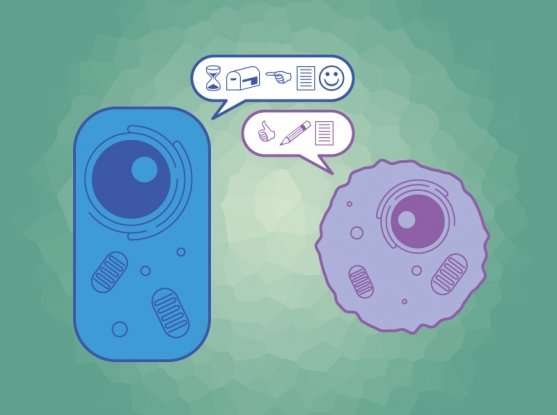Crosstalk between immune and intestinal stem cells may help maintain a healthy gut

From a molecular perspective, the gut is a noisy place, where all manner of human and microbial cells communicate with one another to maintain a robust and healthy cellular community. Key to this community are intestinal stem cells (ISCs), progenitors that produce a variety of cell types that help keep the gut functioning normally. While researchers know that the epithelial cells that line the gut wall and the stromal cells comprising the gut's connective tissues "talk" to ISCs, it was not clear whether and how the immune system is also in on the conversation. The challenge has been to figure out who the parties are, and how they contribute.
Reporting in Cell, a team led by researchers at the Broad Institute announced that they have detected a new form of crosstalk, between a subset of ISCs and T helper (Th) cells living in the gut. (Th cells help guide the activity of other immune cells.) These ISCs, the team found, produce MHC II, a surface protein complex that allows immune and other cells to communicate with, and activate, Th cells. Finally, they found that these ISCs also respond to cytokines produced by these nearby Th cells. (Cytokines are the chemical messengers of the immune system, produced to influence how various cell types behave in different situations.)
How ISCs responded, however, depends on the kind of cytokine signals they heard. Cytokines associated with inflammation pushed ISCs to start differentiating—to produce different cell types found in the gut lining, which may help gut tissues respond to injury or infection.
By contrast, ISCs responded to regulatory cytokines, which help dial down an immune response after an infection has been cleared, by self-renewing. This may help the gut replenish and maintain its pool of ISCs after repair.
In order to detect these cellular communications, the researchers used a combination of single-cell RNA-sequencing (scRNA-seq, a suite of genomic techniques capable of identifying individual cells' gene expression profiles en masse), organoid culture, bacterial and parasitic infection models, and other techniques.
The team's findings raise a number of questions about precisely what kinds of signals intestinal stem cells are transmitting through MHC II. Are they acting as sentinels, and alerting the immune system to pathogenic invaders? Is it a way of telling Th cells to release more renewal- or differentiation-driving cytokines? The team notes that it will take additional work to find the answer, but that it may be that by talking to each other in this way, ISCs and T helper cells work together to help maintain the right balance of immune activity in the gut.
More information: Moshe Biton et al. T Helper Cell Cytokines Modulate Intestinal Stem Cell Renewal and Differentiation, Cell (2018). DOI: 10.1016/j.cell.2018.10.008



















